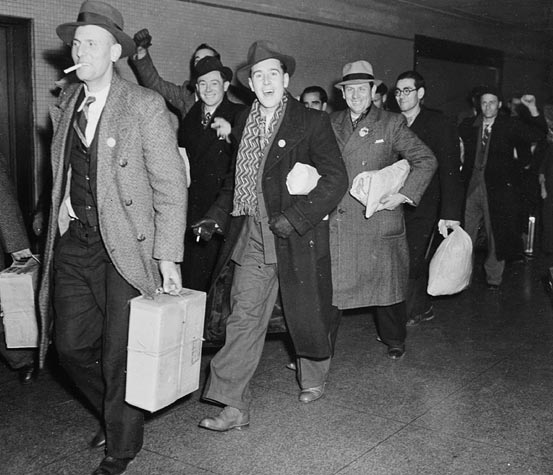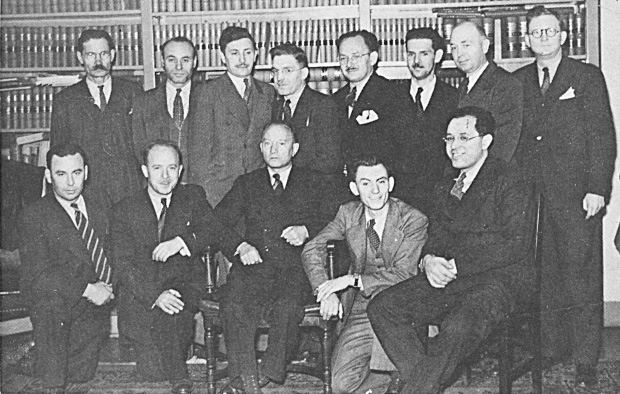Edward Cecil-Smith, journalist and editor, Spanish Republican Army officer and Canadian militiaman (born 10 March 1903 in Guiyang, China; died 1963 in Toronto, Ontario). Cecil-Smith was a prominent organizer and journalist for the Communist Party of Canada during the Great Depression and among the first Canadian volunteers to serve in the International Brigades during the Spanish Civil War. He became the highest-ranking Canadian in the Spanish Republican Army and commanded the Mackenzie-Papineau Battalion.

Early Life
Edward Cecil-Smith's parents were British missionaries in China with the China Inland Mission. He was their third child and was largely raised by Chinese-speaking nannies until he was old enough to attend boarding school at the Chefoo School. He briefly worked in Shanghai as a clerk and served in the Shanghai Volunteer Corps, a local militia force composed of foreigners. In 1919, he came to Toronto, Ontario, with his older sister, Frances. After completing her studies in nursing and theology, Frances returned to China for missionary work. Edward remained in Canada and worked in banking and journalism. During the 1920s, he also served in Canada’s part-time militia as an enlisted engineer. Despite his trade, he became the regimental sergeant major of the Infantry School in Toronto.
The Communist Party
Edward Cecil-Smith joined the Communist Party of Canada in 1931. He had previously been interested in progressive causes but was increasingly drawn toward formal communism after encountering Oscar Ryan and his work through the Workers’ Defence League (WDL), a party organization that hired lawyers and advocated for workers. Cecil-Smith helped Ryan with the WDL and establishment of the Progressive Arts Club (PAC). The PAC organized artists to provide decorations and entertainment at party rallies and to raise awareness of their causes. They printed Masses, a newsletter, and cowrote and produced the play Eight Men Speak, along with Frank Love and Mildred Goldberg. Eight Men Speak was produced to raise money and awareness about the imprisonment of the Communist Party leadership at Kingston Penitentiary and the alleged assassination attempt against Tim Buck in 1932. The play was performed once in Toronto in December 1933. It was later banned from the stage and the mail following intervention by federal, provincial and municipal authorities.

Cecil-Smith was also active with the Friends of the Soviet Union and edited their newsletter, Soviet Russia Today. Although he had no firsthand knowledge of conditions in the Soviet Union, he was a vocal advocate of their system of government and considered criticisms of the Soviet Union to be capitalist propaganda. For instance, he denied the existence of famine in Ukraine resulting from the collectivization of agriculture. Cecil-Smith also led study classes on Communist Party doctrine, served as the president of his ward committee and wrote for the party weekly newspaper, The Worker, and later The Daily Clarion. (See also Marxism.)
Cecil-Smith's wife, Lilian Gouge, shared his politics. She was a PAC member and the stage manager for Eight Men Speak. Lilian and Edward were already connected to Montreal surgeon Norman Bethune through the PAC and the Friends of the Soviet Union, and this relationship was solidified when Lilian fell ill with tuberculosis. Bethune operated on her, and they developed a close relationship. He sent her affectionate letters and souvenirs from China during his time in Mao Zedong’s Eighth Route Army.

Volunteering for the International Brigades
Following the outbreak of the Spanish Civil War, the Communist International organized volunteers to assist the beleaguered Spanish Republic. Once in Spain, these foreign volunteers were enlisted in the Spanish Republican Army and organized into International Brigades. In Canada, recruiting was led by the Communist Party of Canada, with considerable support from non-communist liberals. Edward Cecil-Smith was among the first Canadian volunteers. Due to his previous militia experience, he initially worked as an instructor for newly arrived volunteers. In June 1937, he became a company commander in the George Washington Battalion. He was injured during the Brunete Offensive while leading his company in an attack on the village of Villanueva de la Canada.
After recovery and further work as an instructor in the International Brigade's training system, Cecil-Smith returned to front-line duty in October. The Mackenzie-Papineau Battalion (or Mac-Paps), under the command of American Robert G. Thompson, had taken severe casualties in its first battle at Fuentes de Ebro. Cecil-Smith was among the reinforcements. He briefly served as a company commander and an assistant to Thompson. Thompson returned to the United States within a few weeks due to poor health, and Cecil-Smith became the first and only Canadian battalion commander of the war.
Cecil-Smith distinguished himself in the Mac-Paps’ next battle at Teruel in January 1938. The battalion doggedly held its positions, and Cecil-Smith personally commanded a hastily organized defence against a Nationalist cavalry charge. He also commanded the battalion in a successful night-time raid at Atalaya; during the chaotic retreats following the Nationalist Aragon Offensive in March-April 1938; in the Republic’s final grand offensive in crossing the Ebro River that summer; and in the various defensive actions to retain the territory they had seized from the Nationalists. Cecil-Smith was wounded three times, including a wound from his own pistol near the defensive position at Sierra de Cavalls in September. Although International Brigade commissars alleged that the wound was self-inflicted, on the available evidence it seems just as likely that it was a legitimate accident; Cecil-Smith did not have a good relationship with some of the commissars.

Postwar Career and Life
In October 1938, the Spanish Republic removed most of the foreign volunteers from the fighting force. Cecil-Smith took command of the disbanded Canadians at the Ripoll camp and led a group of 300 Canadian volunteers back to Canada. He returned to Toronto in February 1939.
During the Second World War, Cecil-Smith volunteered to lead a Canadian unit composed of Spanish Civil War veterans to defend Poland. The minister of National Defence, Ian Mackenzie, declined the offer. Cecil-Smith then enlisted in the Canadian Active Service Force. The Royal Canadian Mounted Police advocated for his discharge, however, because of his politics; after Germany and the Soviet Union signed a nonaggression treaty (the Molotov-Ribbentrop Pact), the Communist Party of Canada encouraged disrupting the war effort, and the RCMP feared Cecil-Smith would lead a mutiny. Military records, however, indicate that Cecil-Smith’s conduct was excellent and that he was honourably discharged because of his poor eyesight.
Following his discharge, Cecil-Smith joined the Communist Party-aligned Canadian Seamen’s Union and organized sailors during their strike in April 1940. He also wrote pro-Soviet newspaper articles and a pamphlet, Red Ally: An Estimate of Soviet Life and Soviet Power. At some point thereafter, he quietly drifted away from the Communist Party and began working as an editor in mainstream newspapers and magazines. After the war, he continued to work as a magazine editor in Montreal. He returned to Toronto after having a stroke in 1960 and received treatment at the Sunnybrook Veteran’s Hospital. He died following a second stroke in 1963.

 Share on Facebook
Share on Facebook Share on X
Share on X Share by Email
Share by Email Share on Google Classroom
Share on Google Classroom

